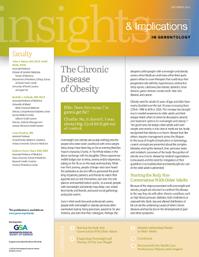THE CHRONIC DISEASE OF
Older adults who receive appropriate obesity treatment can enjoy improved quality of life while adding years to their lifespan.
1 Best Methods for Caring for Older Adults With Obesity or Overweight
Use person-centered language such as “person with obesity” rather than “an obese person.”
2
Learn more about the Chronic Disease of Obesity
This publication is available on geron.org/obesity
3


Collaborate with the older adult patient and interprofessional health care team members.
– As with most chronic diseases,1 the older adult and interprofessional team members play valuable roles in treating obesity or overweight:
• Employ shared decision-making and goal-setting with patients.
• Incorporate current guidelines from the American Heart Association, the American College of Cardiology, The Obesity Society, the American Diabetes Association, the American Gastroenterological Association, the American Association of Clinical Endocrinologists, and the American College of Endocrinology.2-5
• Promote adherence to a healthy diet with adequate protein intake to avoid sarcopenia; include a registered dietician or nutritionist as part of the interprofessional team.
• Incorporate aerobic and resistance exercises into the older adult’s daily routine.
• Connect the older adult with a psychologist to identify new skills and ways of thinking about making healthy choices.
• Incorporate antiobesity medications as adjunctive therapy to lifestyle interventions.
• When indicated, refer an older adult with obesity to a qualified surgeon to determine whether bariatric surgery is an appropriate treatment.
Communicate the need to commit to lifelong management with regular follow-up visits with interprofessional team members.
References
1. American Medical Association. AMA Policy Finder: H-440.842 Recognition of Obesity as a Disease. https://policysearch.ama-assn.org/policyfinder/detail/obesity?uri=%2FAMADoc%2FHOD.xml-0-3858.xml
2. Jensen MD, Ryan DH, Apovian CM, et al. 2013 AHA/ACC/TOS guideline for the management of overweight and obesity in adults: a report of the American College of Cardiology/American Heart Association Task Force on Practice Guidelines and The Obesity Society. Circulation. 2014;129(25 suppl 2):S102–S138. doi:10.1161/01.cir.0000437739.71477.ee
3. ElSayed NA, Aleppo G, Aroda VR, et al. Obesity and weight management for the prevention and treatment of type 2 diabetes: standards of care in diabetes—2023. Diabetes Care. 2023;46(suppl 1):S128–S139. doi:10.2337/dc23-S008
4. Grunvald E, Shah R, Hernaez R, et al. AGA clinical practice guideline on pharmacological interventions for adults with obesity. Gastroenterology. 2022;163(5):1198–1225. doi:10.1053/j.gastro.2022.08.045
5. Garvey WT, Mechanick JI, Brett EM, et al. American Association of Clinical Endocrinologists and American College of Endocrinology comprehensive clinical practice guidelines for medical care of patients with obesity. Endocr Pract. 2016;22(suppl 3):1–203. doi:10.4158/EP161365.GL



